#tokidr
Explore tagged Tumblr posts
Text
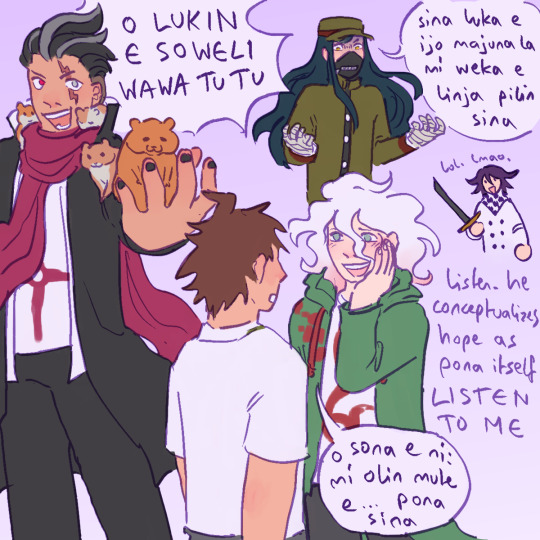
translating in game stuff... yeag
#I know I made a post abt nagitos fte not long ago but I just needed to talk about it more. hes in my head#danganronpa#dr#sdr2#ndrv3#gundham tanaka#korekiyo shinguji#kokichi ouma#hajime hinata#nagito komaeda#komahina#conlangs#toki pona#tokidr
167 notes
·
View notes
Text
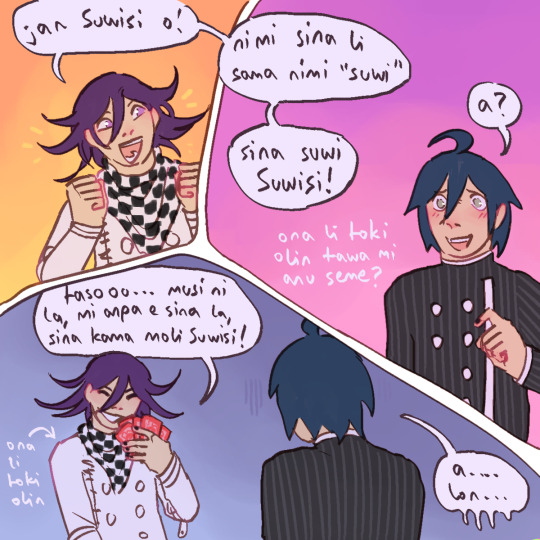
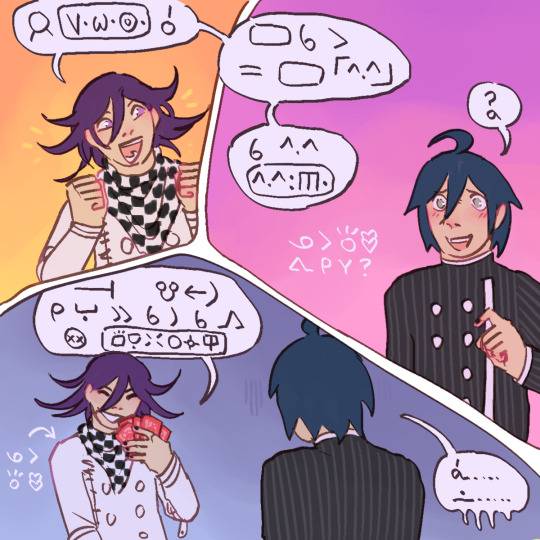
hello hi Im toki ponaing again
#I know the overlap between danganronpa and toki pona is like -3 people but I stay silly goddammit#also I did originally want to translate this but since its essentially a pun about headnouns and tokiponized names#and I didnt feel like explainign all that when I already have a post abt it. so I just didnt#but trust me when I say I did some fun things with the way I used sitelen pona here#danganronpa#dr#ndrv3#kokichi ouma#shuichi saihara#saiouma#conlangs#toki pona#tokidr
145 notes
·
View notes
Note
toki!!!! (hello!) i am a danganronpaer and i just started learning toki pona so ur dr/toki pona posts are my LIFE rn
tokiii! hi thanks for being in this tiny sliver of a venn diagram with me. also this reminded me that tokidr was a thing I was working on at some point so I might get back to that
3 notes
·
View notes
Note
sina pali musi li pona mute! (just learning the language again, this might not be the best way to translate 'art' - but your art is rlly nice! and ur toki pona danganronpa stuff rules and is so fun see :3) (sorry if this sends multiple times, tumblr ask is being weird!)
aa thank you! this totally didnt remind me that I straight up forgot abt the tokidr thing haha
also some notes: pali musi is perfectly acceptable for art, although if you want to be more specific that its visual art you could use sitelen. also, the sina needs to be after pali musi because possessive pronouns act as modifiers. otherwise youre doing great so far ^w^
3 notes
·
View notes
Text
Danganronpa in toki pona part 1: names
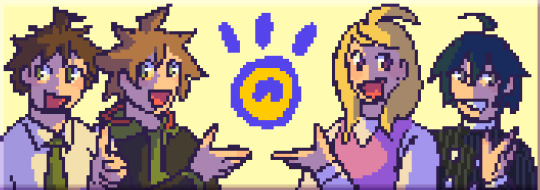
toki!
since Im both a danganronpa fan and a conlang enjoyer, I had the idea a while ago to try and translate parts of it into toki pona (not whole games, god no. just snippets, maybe some ftes). while I assume this is mostly going to interest people who already know about conlangs, I still want it to be readable by people who have never heard of them in their life. so
what is toki pona?
toki pona is a conlang (short for constructed language, a language someone made up, think: esperanto or tolkiens languages. theres a lot I could talk about here but rn thats all you need to know) made by sonja lang. it was created to be as minimalistic as possible with a vocabulary of about 120 - 150 words depending on who you ask. it onls has 9 consonants and 5 vowels, which means theres some restrictions for how you can transliterate names into toki pona (called 'tokiponization').
lets get into how that works
tokiponization
since tokiponization is based on pronounciation rather than spelling, its important to know what sounds were working with. this is where I might lose some folks that dont know any linguistics stuff, but this section is optional. you only need to read it to find out how the names turned out the way they did, and how to say them out loud.
consonants
the nine consonants of toki pona are m, n, p, t, k, s, w, l, j. these are pronounced like their ipa (international phonetic alphabet) counterparts. its not necessary to know what that means, just know that [j] is pronounced like english <y> (as in yes, not as in synth). everything is else is p much how an english speaker would expect it.
the way consonants are tokiponized goes as follows:
voiced stops and fricatives are devoiced (z, d, g, b > s, t, k, p)
labial fricatives (f, ɸ) become p
coronal fricatives (and affricates) (θ, ʃ, ɕ, ts, tʃ, tɕ) become s
the japanese r [r] becomes l (the english r [ɻ] becomes w)
h is dropped word-initially and becomes w or j intervocalically
v can become p or w but Ill use w here
vowels
toki ponas vowels are a, e, i, o, u. this is almost the same as japanese, which has ɯ instead of u, but since its just the same sound with a rounding difference its tokiponized as u. japanese also has a length distinction, which toki pona doesnt, meaning long and short vowels will simply be the same length.
syllables
toki ponas syllable structure is CV(n) meaning that each syllable must have a consonant and a vowel (except word-initially where it can be just a vowel) and can optionally end in n. this is fairly similar to japanese syllable structure, but one thing is that japanese has palatalized consonants. this is pretty easy to solve by just inserting -ij- to mimic the sound. generally with tokiponization its preferable to preserve syllable count rather than add extra sounds but 1) if you say it quickly its barely noticable and 2) its my project and I can do what I want.
the other thing is that while in toki pona, vowels need to be seperated by at least one consonant, japanese allows you to theoretically chain together as many vowels as you want. I tried to find out whether vowel sequences are pronounced as diphthongs or disyllabically and turns out its a little complicated because those terms are defined in terms of syllables and japanese is mora-timed rather than syllable-timed. Ill admit I only have the faintest clue what a mora is but for the purposes of this project I will be treating vowel sequences as seperate syllables when possible. if it isnt, due to the syllables wu, wo, ji, and ti being forbidden in toki pona, Ill treat them like diphthongs in that the second vowel is just dropped entirely.
some smaller notes:
the only phoneme allowed in syllable codas is n, so for example gundham becomes kantan
stress always falls on the first syllable
and the final, rather important thing
the way names work in toki pona is that you have to describe what the thing is before saying the name (for example, canada is called ma Kanata, which literally means canada-place). therefore people are generally called jan [name], however, some tokiponists use a different term before their name (called a head noun) either for fun or to express something about themselves (such as many plural systems using kulupu ("group")).
theres quite a few options for varying what head nouns someone uses for themselves or others to add nuances. for example, I think gundham might refer to himself as a jan wawa ("powerful (in the sense of supernatural powers in this case) person"), or perhaps hiyoko might call mikan a jaki instead of a jan to insult her. theres a lot of fun to be had here.
the actual names
THH:
jan Makoto Najeki
jan Kijoko Kilikili (note: kili is the toki pona word for fruit so her name here literally says fruit-fruit)
jan Pijakuja Tokami
jan Toko Pukawa
jan (moli) So (note: jan moli here would mean killer to translate the spirit of her original title better, but since her talent would include it anyways Im not sure whether to use it?)
jan Sajaka Masono
jan Lejon Kuwata
jan Siwilo Pusisaki (note: yes this means their name is pronounced pussysaki. do with this info what you will)
jan ante/jasima (note: alter ego. lit: "different/reflection person", I feel like jasima fits more but Im also kinda unsura abt using nimi pu ala in the names and talents. I would definitely use at least nimi ku suli in the actual translations but for names and talents its like. hm :/)
jan Monto Owata
jan Kijotaka Isimalu
jan Ipumi Jamata
jan Selesija Lutenbeku/Tajeko Jasuwilo
jan Jasuwilo Akakule
jan Sakula Okami
jan Awi Asawina
jan Mukulo Ikusapa
jan Sunko Enosima
soweli Monokuma
SDR2
jan Asime Inata
jan Isulu Kamukula
jan Sijaki Nanami
jan Nakito Komajeta (note: I think he may also switch to a more self deprecating head noun when hes having a Moment)
jan Sakisi/Pijakuja Tukami (note: since tu means two, the togami/twogami thing works just as much in toki pona as it does in english)
jan Lijota Mitala
jan Telutelu Anamula
jan Mawilu Kowisumi
jan Peko Pekojama
jan Pujuwiko Kusuliju
jan Ipuki Mijota
jan Ijoko Sajonsi
jan Mikan Sumiki
jan Akane Owali
jan Nekomalu Nita
jan Kantan Tanaka (note: probably calls himself jan wawa or perhaps even usawi ("magic/supernatural") if I feel spicy enough to include nimi sin)
jan Sonja Newaman
jan Kasuwisi Sota
soweli Usami/Monomi
NDRV3
jan Kajete Akamasu
jan Suwisi Sajala
jan Kato Momota
jan Maki Alukawa
jan Kokisi Oma
jan Lantalo Amami
jan Lijoma Osi
jan Kilumi Toso
jan Imiko Jumeno
jan Ansi Jonaka
jan Tenko Sapasila
jan Kolekiju Sinkusi
jan Miju Iluma (note: I think she may also call herself jan sona or smth like that for "genius")
jan Konta Kokuwala
jan Kipo (note: possibly he gets called jan ilo (robot, lit: "tool/machine-person") to convey how the others set him apart from humans at times. kokichi probably calls him just ilo when he wants to get a rise out of him)
jan Sumuki Silokane
soweli Monotalo
soweli Monosuke
soweli Monopani
soweli Monotan
soweli Monokito
UDG. I guess
jan Komalu Najeki
jan Monaka Towa
jan Masalu Tamon
jan Satalo Kemuli
jan Kotoko Usuki
jan Nakisa Sinkesu
jan anpa (note: this is servant, anpa means "below, downward, lowly")
jan Asi Towa
jan Iloko Akakule
jan Tasi Pusisaki
jan Juta Asawina
soweli Silokuma
soweli Kulokuma
#this is my personal little autism project <3 even if it has an audience of like -2 people#danganronpa#dr#thh#sdr2#ndrv3#udg#toki pona#conlangs#tokidr
65 notes
·
View notes
Text
Danganronpa in toki pona, part 2: talents
if you havent read the first part go do that
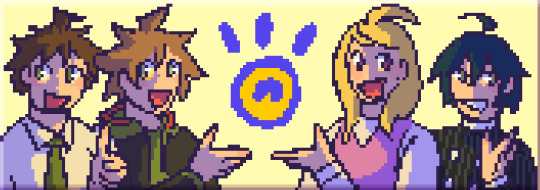
toki!
the first post only focused on transliterating, but now were getting into actual translation territory. that means I get to explain toki pona words and grammar. the main two words Ill be using here are ken (ability, skill (but also possibility)) and wawa (power). then there is of course jan (person) to talk about the actual students. for convenience, and to keep with the toki pona spirit, I will try my best to keep phrases short and only use up to one pi.
speaking of which
what the hell is pi?
this is one of the aspects of the language that is most difficult for new learners to grasp because theres really nothing like this in english. so, in toki pona you cant really combine multiple words into one (a process called agglutination, something you might know from jokes about how long german words can get) instead, you have one main word that you attach modifiers to (names, by the way, are always modifiers in toki pona, which is why they need a head noun). so a phrase X Y can be interpreted as "X exhibiting qualities of Y, Y-ish X, X of Y, Y's X", stuff like that.
but things get ambiguous when you have three words. "mute" means many, a lot, etc, but its also used to mean "very". so if you read something like jan pona mute, how are you supposed to know whether its "many good people" or a "very good person"? this is where pi comes in. pi regroups modifiers, and its easiest to show this with brackets. if you do not use pi, modifiers apply to all the words before them. so jan pona mute is ((jan pona) mute), many good people. jan pi pona mute, however, is (jan (pona mute)), a very good person. this is a very important concept to understand in toki pona.
a note about translation & interpretation
words in toki pona dont really correspond 1:1 to any specific word. rather, they cover a range of meaning that can be intepreted in various ways depending on context. akesi Lipamanka calls these ranges "semantic spaces" and has started writing a dictionary based on them. this is sort of like calling something a building and not specifying whether you mean a house, a school, a church, a shopping mall, etc. if its obvious from context, then you dont need to specify. the only difference is that toki pona words generally have broader ranges than english words. just know that for any translation and backtranslation I give, theres a lot of other ways someone could read them.
also, ideally all of the talents would actually be translated into full introductory sentences, both because its more pona and because, again, itd provide some neat opportunities for distinction between characters, especially ones who share a talent. but whenever I need to refer to their talents in a short-form way, these phrases will have to do.
so, aside from individual pieces of vocab, theres not much else to know. I will explain everything else as I go along.
- - -
talentless - jan ken ala (not skilled-person, non-ultimate) or jan pi ken ala (unskilled person, someone with no skills) Im sure theres something fun to be done with the subtle difference between these
ultimate ??? - jan pi ken ???
- - -
ultimate lucky student - jan wawa pi ken pona ("powerful good-possibilites person", luck is.. difficult to translate, but I feel like ken pona is alright at being both concise and clear enough in meaning. its also a wawa cause yknow. luck isnt really a skill)
ultimate detective - jan ken pi kama sona ("skilled knowledge-aquiring person", yeah, no notes here. after all what is a detective if not one who figures out information?)
ultimate affluent progeny - jan wawa pi mani mute ("powerful rich person", I didnt really lean into the heir aspect here sorry. I also do not really care about this guy so eh)
ultimate writer - jan ken pi toki musi ("skilled entertaining-words person", musi is a rather broad category so I think it fits for stories)
ultimate murderous fiend - jan moli ken ("skilled death-person", pretty self explanatory)
ultimate pop sensation - jan ken pi kalama musi ("skilled fun-sounds person", so I really wanted to make sure I distinguished the music-based talents cause technically you could just reduce all of them to kalama. kalama musi is a pretty widely used and generic phrase for music, which imo fits well for pop)
ultimate baseball player - jan ken pi tawa sike ("skilled ball-movement/circular movement person", okay so. I was originally going to talk about how I wouldnt be able to disambiguate the two ball sport related talents bc like. theyre both about moving balls, sike tawa. but then I had the absolute genius idea to use tawa sike instead since it can refer to both the movement of the baseball itself and the circular movement of running around the bases)
ultimate programmer - jan ken pi ilo nanpa ("skilled computer person", ilo nanpa is a fairly common way of referring to electronic devices so. yeah)
ultimate biker gang leader - jan wawa pi lawa kulupu ("powerful group-leadership person" uhhgh sorry I dont really know how to put the kon of "biker gang" into an short phrase. this is an example of why full sentences to describe talents would probably be more apt)
ultimate moral compass - jan wawa pi nasin pona ("powerful good-rules person" nasin can be interpreted as a lot of things, but fundamentally it is some sort of way one might follow, either physical like a path or metaphorical like rules (fun fact: in the context of languages, its often used to mean grammar. people who speak toki pona in a way that deviates from common usage generally call this their personal nasin)
ultimate fanfic creator - jan ken pi sitelen musi ("skilled entertaining-pictures person", I think thats a reasonable translation of comics? plus sitelen can also refer to writing so it works in two ways)
ultimate gambler - jan wawa pi musi mani ("powerful money-games person", also a luck-based talent, therefore a wawa. I dont think this one needs much explanation)
ultimate martial artist - jan wawa ken ("skilled strong person", wawa can also mean physical strength so. I really wanted her to be a jan wawa and a jan ken, to emphasize her strength and add to her initial intimidation factor)
ultimate swimmer - jan ken pi tawa telo/kala ("skilled water-movement/fishlike movement person" both of those are fairly uncontroversial ways to describe swimmimg. no notes here)
ultimate clairvoyant - jan wawa pi sona kama/jan sona pi tenpo kama ("powerful incoming-knowledge person/"future knowledge-person", uouuugh. this is one of the ones that gave me the most trouble. clairvoyance is something thats real fucking difficult to put into a quick and snappy phrase. moreover, I think the second phrase is more accurate but it doesnt include wawa which would set him apart from other ultimates for basically no reason? like mayybe I could say jan wawa pi tenpo kama but "future powers" is a bit too vague imo :/)
ultimate soldier - jan utala ken ("skilled battle person", no notes here)
ultimate fashionista - jan ken pi len pona ("skilled good-clothes person", theres a lot of ways you could go about translating fashion, but I think this one suffices. do not even ask me to try and translate ultimate analyst into a simple phrase I will literally die)
- - -
ultimate everything - jan pi ken ale ("all-abilities person", fitting + contrasts nicely with jan pi ken ala)
ultimate gamer - jan musi ken ("skilled games person", musi refers to anything related to entertainment, and its often used on its own to say game so. yeah)
ultimate imposter - jan ken pi jan ante ("skilled other-people person", again, I think this one especially suffers from not being in full sentences, but I think its still accurate. their talent is (being) other people)
ultimate animator - jan ken pi sitelen tawa ("skilled moving-pictures person", sitelen tawa is a fairly common & uncontroversial translation of movies/videos/animations so yeah)
ultimate chef - jan moku ken ("skilled food person", I really really dont think toki pona is built to get across the tiny little nuance cook vs chef so I guess thats staying out of the tp translation? then again I dont think Ill translate anything with teruteru in it because I dont really like him at all)
ultimate photographer - jan ken pi ilo sitelen ("skilled picture-tool person", no notes)
ultimate swordswoman - jan ken pi ilo utala ("skilled fighting-tool person", no notes)
ultimate yakuza - jan wawa pi kulupu Jakusa ("powerful Yakuza-group person", Im gonna say it outright, any attempts to describe the yakuza in this tiny little phrase turned out reductive and Bad. you really cant put the intricacies of organized crime into a two word toki pona phrase. it does feel kind of like cheating to simply tokiponize the word but the other options all suck ass. the actual description will simply have to be contained in fuyuhikos introduction, where I can use full sentences)
ultimate musician - jan ken pi kalama wawa ("skilled loud-sound person", like I said, I wanted to differentiate the kalama-based talents, and if theres one thing ibukis music is, its loud)
ultimate traditional dancer - jan ken pi tawa musi ("skilled entertaining-movement person", yeah, fairly normal way to say dancing. thats it)
ultimate nurse - jan ken pi pona sijelo ("skilled body-wellness person", if youre partial to nimi ku suli, you could also replace pona sijelo with misikeke ("medicine"), though due to the changed modifier amount the whole thing would then be jan misikeke ken)
ultimate gymnast - jan ken pi tawa mute ("skilled lots-of-movement person", no notes)
ultimate team manager - jan ken pi pona kulupu ("skilled group-wellness person", no notes)
ultimate breeder - jan ken pi soweli mute ("skilled many-animals person", while calling his talent unpa soweli might be more accurate to him being a breeder, I really really didnt want to call him the animal sex guy)
ultimate princess - jan lawa ken ("skilled leader", so, I generally consider leadership to be a wawa rather than a ken, however, I also wanted a way to contrast her talent w kokichis, and I think wawa is more capable of having sinister undertones than ken. I mean think about it, between "skilled leader" and "powerful leader", who sounds more menacing?)
ultimate mechanic - jan ken pi pona ilo ("skilled machine-wellness person", no notes)
- - -
ultimate pianist - jan ken pi ilo kalama ("skilled instrument (sound-tool) person", since theres no other talent that specifically mentions an instrument theres no need to specifically describe a piano)
ultimate child caregiver - jan awen ken pi jan sin ("skilled child (new/young-person) protection person, so I wasnt quite sure how to convey taking care of someone without using too many words, but I think awen comes close enough? because youre keeping them safe and happy? I dunno. though I do like that awen doesnt necessarily imply that maki would be nice to them, which I think could work in her favor?)
ultimate assassin - jan ken pi moli len ("skilled hidden-death person", no notes)
ultimate astronaut - jan ken pi tawa mun ("skilled star-travel person", no notes)
ultimate.. leader - jan lawa wawa ("powerful leader", like I said earlier, I think this makes him sound kind of ominous which fits the way he presents himself over the course of the game)
ultimate adventurer - jan ken pi tawa musi ("skilled? entertaining-travel person", because what is an adventure if not an exciting journey. also Im not sure how going on adventures is necessarily a skill but its even less of a wawa, so)
ultimate tennis player - jan ken pi sike tawa ("skilled moving-ball person", having tawa sike vs sike tawa as disambiguation between this and baseball is like, really flimsy but its better than nothing so Im keeping it)
ultimate maid - jan ken pi pali mute ("skilled many-jobs person", yeah, I think this pretty much gets across her Mädchen für Alles (lit. "girl for everything", a person whos there to help with anything and everything when someone needs them) energy)
ultimate magician - jan ken pi wawa musi (calls herself jan usawi wawa) ("skilled entertaining-powers person/powerful magic person", so. usawi is one of them newfangled words that barely anyone uses but its special to me bc jan Usawi makes some damn good music. also I read somewhere that in the japanese version himiko actually speaks in a distinct dialect? therefore I think itd be kind of cool for her to use nimisin that no one else does)
ultimate neo-aikido master - jan ken pi tawa wawa/tawa Akito ("skilled powerful-movement/Aikido-movement person", uhh this one could go either way. tawa wawa is more descriptive but tawa Akito is clearer abt the fact that its aikido specifically? then again it always feels a bit like cheating to just tokiponize. what ever)
ultimate artist - jan ken pi kiwen sitelen ("skilled artful-stone(or other hard material) person", shes a sculptor. thats her talent. why did they just translate it as generic artist SHES A SCULPTOR. shaking the localization by the neck)
ultimate anthropologist - jan ken pi sona jan ("skilled people-knowledge person", no notes on the talent itself but I heard this guy talks in a sort of archaic way. therefore Id like to propose that he uses majuna bc its a pre-pu (therefore old) word and the word itself means ancient. I think it would be funny if that was a word he used, and perhaps also limited to no usage of ku words? much to think about)
ultimate inventor - jan ken pi ilo sin ("skilled new-tools/machines person", no notes)
ultimate entomologist - jan ken pi sona pipi ("skilled bug-knowledge person", no notes)
ultimate robot - jan ilo wawa ("powerful machine-person", as mentioned in the names post I think theres some interesting stuff to be done with people referring to him differently, especially kokichi)
ultimate cosplayer - jan ken pi len ante ("skilled different-clothes person", so obviously cosplaying is more than just clothes, however it works well enough here + len can also mean cover in a metaphorical sense, like hidden things and secrets. which works rather well I think)
23 notes
·
View notes